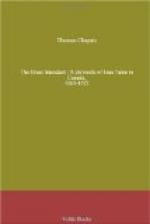Writing to Colbert, Talon said he would have been greatly pleased if, in addition to these rights, the king had retained the fiscal powers of the crown. He declared that the taxes were productive, yet the company’s agent seemed very reluctant to pay the public charges. Colbert, of course, decided that the company, in accordance with its charter, was entitled to enjoy the fiscal rights upon condition of defraying annually the ordinary public expenditure of the country, as the company which preceded it had done. Immediately another point was raised. What should be the amount of the public expenditure, or rather, to what figure should the company be allowed to reduce it? Talon maintained that the public charges defrayed by the former company amounted to 48,950 livres. [Footnote: The livre was equivalent to the later franc, about twenty cents of modern Canadian currency.] The company’s agent contended that they amounted only to 29,200 livres and that the sum of 48,950 livres was exorbitant, as it exceeded by 4000 livres the highest sum ever received from farming out the revenue. [Footnote: It was the custom in New France to sell or farm out the revenues. Instead of collecting direct the fur taxes and the proceeds of the Tadoussac trade, the government granted the rights to a corporation or a private individual in return for a fixed sum annually.] To this the intendant replied by submitting evidence that the rights were farmed out for 50,000 livres in 1660 and in 1663; moreover, the rights were more valuable now, for with the conclusion of peace trade would prosper. In the end Colbert decided that the sum payable by the company should be 36,000 livres annually. The ordinary revenue of New France was thus fixed, and remained at that sum for many years.
It must not be supposed that this revenue was sufficient to meet all the expenses connected with the defence and development of the colony. There was an extraordinary fund provided by the king’s treasury and devoted to the movement and maintenance of the troops, the payment of certain special emoluments, the transport of new settlers, horses, and sheep, the construction of forts, the purchase and shipment of supplies. In 1665 this extraordinary budget amounted to 358,000 livres.
Talon’s energetic action on the question of the revenue was inspired by his knowledge of the public needs. He knew that many things requiring money had to be done. A new country like Canada could not be opened up for settlement without expense, and he thought that the traders who reaped the benefit of their monopoly should pay their due share of the outlay.




